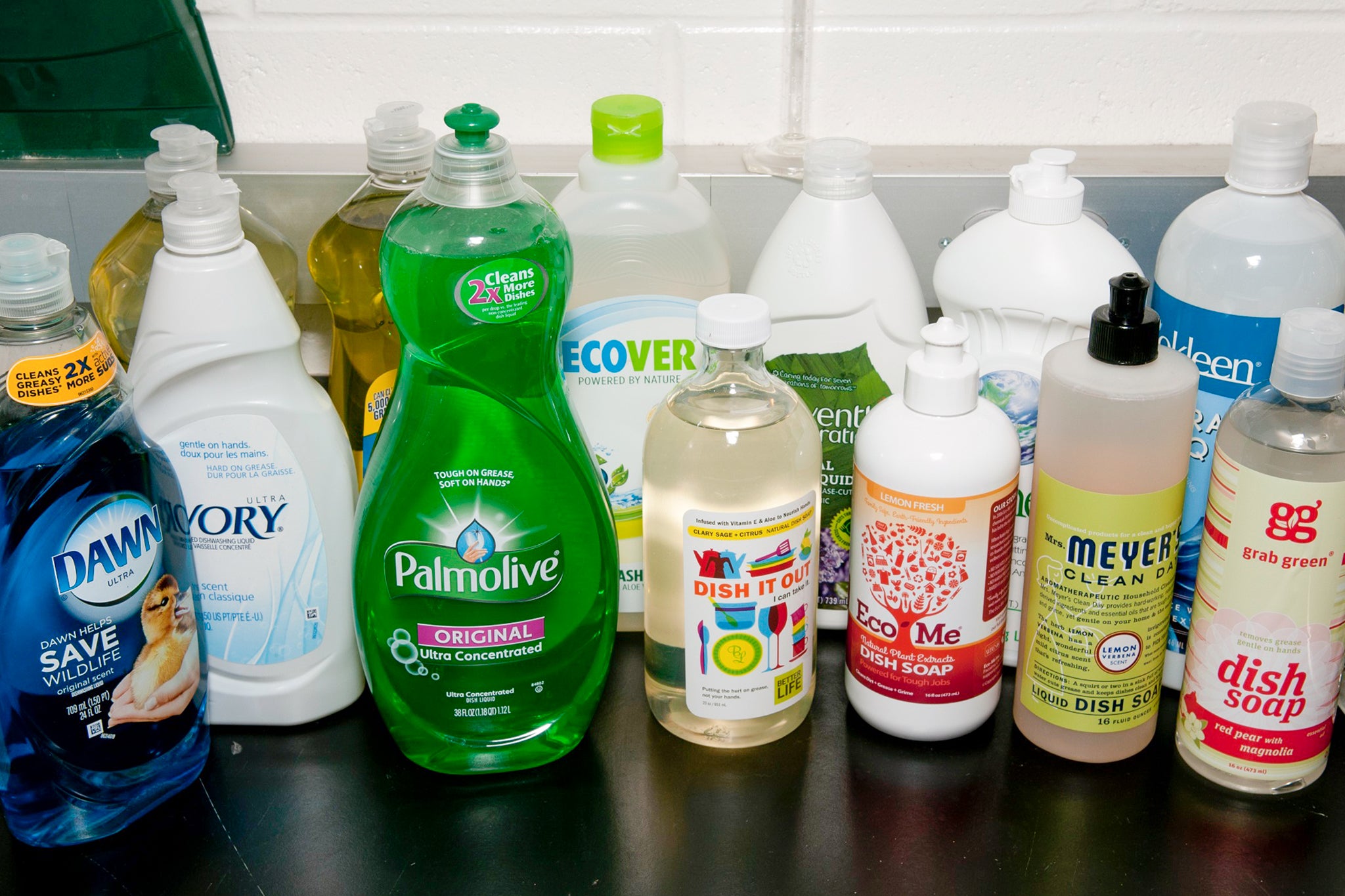Dish soap is one of those household items that we often take for granted, but it plays a crucial role in keeping our kitchens clean and our dishes spotless. Whether you’re washing your favorite mug or cleaning up after a big dinner party, dish-soap helps remove grease, grime, and food particles that can accumulate on dishes, cookware, and utensils. This guide will explore the different types of dish-soaps, their uses, benefits, and answer some frequently asked questions about this indispensable kitchen staple.
What is Dish Soap?
Dish-soap, often referred to as dishwashing liquid or dish detergent, is a cleaning agent specifically formulated to help remove oils, grease, food residues, and stains from dishes, pots, pans, and utensils. It typically contains surfactants—compounds that lower the surface tension between water and grease—allowing the soap to lift dirt and oils from the surface of dishes and suspend them in water so they can be rinsed away.
Dish-soaps are generally biodegradable and come in a wide range of formulations, from eco-friendly natural options to more industrial, high-strength detergents.
Types of Dish Soap
- Traditional Dish Soap
The most common type, often found in most households, is conventional dish-soap. It is effective at breaking down grease and grime and typically comes in liquid form. Some of these soaps can also contain added fragrances, dyes, and antibacterial agents. Popular brands include Dawn, Palmolive, and Fairy.
- Eco-Friendly or Natural Dish Soap
For those who are environmentally conscious, eco-friendly dish-soaps are available. These are made from plant-based ingredients and often come in biodegradable packaging. They avoid harsh chemicals like phosphates, parabens, or sulfates. Brands like Seventh Generation, Mrs. Meyer’s Clean Day, and Ecover are popular choices.
- Antibacterial Dish Soap
Some dish-soaps contain antibacterial agents like triclosan or other chemicals that claim to kill germs and bacteria. These are marketed as offering extra protection against contamination from raw meat, dirty dishes, and bacteria transfer. However, experts warn against overuse of antibacterial soaps due to the potential for creating resistant strains of bacteria.
- Concentrated Dish Soap
Concentrated dish-soaps are formulated to be used in smaller amounts while still providing the same cleaning power. These are often more economical in the long run and better for the environment as they use less packaging. However, concentrated soaps can sometimes be harsher on the skin, so it’s important to dilute them properly.
- Free & Clear Dish Soap
These dish-soaps are free of fragrances, dyes, and harsh chemicals, making them ideal for people with sensitive skin or allergies. They are often recommended for individuals with eczema, dermatitis, or other skin conditions.
- Automatic Dishwasher Detergent
While not technically “dish-soap,” automatic dishwasher detergent is worth mentioning here. These are specially formulated detergents for use in dishwashers, and they often come in powder, liquid, or pod form. They are designed to clean dishes in a dishwasher, but they are not suitable for hand washing dishes.
Ingredients in Dish Soap
Dish-soaps contain a variety of ingredients, each serving a specific function. Here are some of the most common:
- Surfactants: These are the primary cleaning agents in dish-soap, which help break down oils and dirt. Sodium lauryl sulfate (SLS) and sodium laureth sulfate (SLES) are two common surfactants.
- Solvents: These dissolve the grease and oil on your dishes, making it easier for surfactants to break them down.
- Fragrances and Dyes: These are added to make the soap smell good and look appealing. Natural fragrance options may include essential oils.
- Thickeners: Some dish-soaps contain ingredients like xanthan gum or glycerin to give the soap a thicker, more gel-like consistency.
- Preservatives: To prevent bacterial growth, preservatives are added to extend shelf life.
Benefits of Using Dish Soap
- Grease Removal
Dish-soap is formulated to break down grease and fats, which makes it essential for cleaning items like pots, pans, and greasy dishes. It is especially effective at breaking down oils from meats, dairy, and cooking oils, ensuring your dishes come out clean and residue-free.
- Cost-Effective
Dish-soap is one of the most affordable cleaning products available. It can be used for a variety of cleaning tasks, making it versatile and cost-effective. Concentrated formulas allow you to use less product, making each bottle last longer.
- Gentle on Hands (Depending on Formula)
Many modern dish-soaps are designed to be gentle on hands, containing moisturizing agents like glycerin or aloe vera. However, some stronger formulations can still be harsh on the skin, so it’s important to pick a product that matches your needs.
- Multipurpose Uses
Dish-soap isn’t just for washing dishes! It can be used to clean countertops, sinks, stovetops, and even for personal hygiene in emergencies. Some people even use dish-soap to wash fruits and vegetables to remove pesticides and wax.
- Environmentally Friendly Options
Many eco-friendly dish-soaps contain biodegradable ingredients, meaning they break down naturally without harming the environment. These soaps typically come in sustainable packaging and avoid using harsh chemicals that can pollute water sources.
- Effective Against Bacteria
Although dish-soap isn’t meant to be a disinfectant, it can still help reduce bacterial contamination by removing food residues and grease where germs tend to thrive. For a more powerful antimicrobial effect, you can combine dish-soap with vinegar or baking soda.
Common Uses for Dish Soap
- Hand Washing Dishes
This is the most common use for dish-soap. Whether you’re hand-washing a few plates after a meal or cleaning up a large set of cookware, dish-soap makes the process easier and more efficient.
- Cleaning Kitchen Surfaces
Dish soap can be diluted with water to wipe down kitchen counters, sinks, and stovetops, helping to remove grease and food residues.
- Stain Removal
Dish soap can be used on clothing and fabric stains, particularly grease stains. Apply a small amount to the stain, rub gently, and let it sit before washing.
- Cleaning Pets
In emergencies, dish soap can be used to clean pets. Its gentle, yet effective formula can remove oils from their fur. Be sure to use a mild formula, as some soaps can be too harsh for pets’ sensitive skin.
- Washing Fruits and Vegetables
For cleaning produce, a mild dish soap can help remove dirt, wax, and pesticide residues from the surface of fruits and vegetables. Always rinse thoroughly afterward.
Frequently Asked Questions About Dish Soap
1. Is dish soap safe for my skin?
Most dish soaps are safe for skin, but some can cause dryness or irritation, especially if they contain strong surfactants or artificial fragrances. If you have sensitive skin, look for soaps labeled “gentle” or “free and clear,” which are less likely to cause irritation.
2. Can I use dish soap to wash my car?
While you can technically use dish soap to wash your car, it’s not recommended. Dish soap can strip away protective wax and damage the car’s paint over time. It’s better to use a car-specific detergent that’s designed to be gentle on your car’s finish.
3. Can dish soap be used to wash fruits and vegetables?
Yes, a small amount of dish soap can help clean fruits and vegetables. However, it’s important to thoroughly rinse them afterward to remove any soap residue.
4. What is the difference between dish soap and dishwasher detergent?
Dish soap is designed for hand washing dishes, while dishwasher detergent is formulated for use in dishwashers. Dishwasher detergent typically contains stronger cleaning agents and may come in powder, gel, or pod form.
5. Can dish soap be used to clean my kitchen sink?
Yes, dish soap can be used to clean your kitchen sink. Just apply a small amount to a sponge or cloth, scrub the sink, and rinse thoroughly. For tough stains, you can combine dish soap with baking soda.
6. How do I store dish soap?
Store dish soap in a cool, dry place, away from direct sunlight. Keep the cap tightly closed to prevent leakage.
7. Can dish soap be used to clean pet dishes?
Yes, dish soap is safe for cleaning pet dishes. Just make sure to rinse them thoroughly after washing to avoid any residual soap.
Conclusion
Dish soap is a versatile, affordable, and essential cleaning tool in any kitchen. From its ability to cut through grease to its multiple other uses around the home, it’s no wonder dish soap is considered a must-have. Whether you’re looking for an eco-friendly option or a heavy-duty grease fighter, there’s a dish soap out there to suit your needs. By choosing the right product for your situation and following best practices for use, you can ensure that your dishes, surfaces, and home stay sparkling clean while keeping your skin and the environment safe.

 News8 months ago
News8 months ago
 Tech8 months ago
Tech8 months ago
 News8 months ago
News8 months ago
 Life style8 months ago
Life style8 months ago
 Life style8 months ago
Life style8 months ago
 Business8 months ago
Business8 months ago
 News8 months ago
News8 months ago
 entertainment8 months ago
entertainment8 months ago
